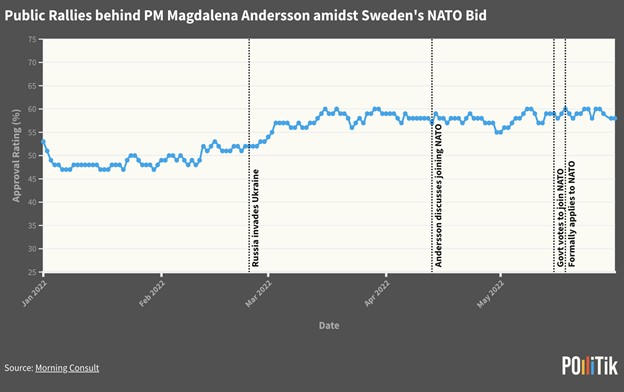This is a guest post by our partners at Pollitik. It was written by Kelsi Quick at Georgia State University for Pollitik’s editorial team.
Swedish Prime Minister Magdalena Andersson of the Social Democratic Party recently led her people down a path towards NATO membership, much to the chagrin of Russian President Vladimir Putin and Turkish President Recep Tayyip Erdogan. Despite Sweden’s tradition of non-alignment, the move has proved popular among Swedes.
But joining NATO isn’t the only precedent Andersson is breaking. A strong rally in Andersson’s approval ratings represents an important counterexample to the historical tendency of the public to shrink from female political executives during national security crises.
‘There is a before and after 24 February’
Russia’s invasion of Ukraine on 24 February plunged European governments into serious reflection on existing security agreements and alliances. In a recent joint press conference with Finnish PM Sanna Marin about their countries’ NATO bids, Andersson said ‘There is a before and after 24 February… the security landscape has completely changed.’ If this marks a turning point in Sweden’s security history, it also marks a significant turning point in Andersson’s own approval ratings.

The graph above plots Andersson’s approval ratings over 2022 measured in a seven-day rolling average by Morning Consult. She took office 30 November, 2021, and enjoyed a brief honeymoon, still visible in January 2022.
Russia’s invasion of Ukraine is indicated by the first vertical annotation on 24 February. While the PM’s approval ratings had begun to rebound in the run-up to the invasion, that date is a clear inflection point. From the beginning of 2022 to 24 February, Andersson averaged an approval rating of 49.2%. Since 25 February to the most recent reading on 31 May, Andersson’s average approval rating was 57.8% – +8.6 percentage points.
This surge in PM approval represents a classic ‘rally ‘round the flag effect’ Such effects are caused by a spike in patriotism when confronted with an external threat and are sustained as long as the opposition resists serious criticism of the government’s response. So far, Andersson has kept the rally going. Her approval ratings peaked at 60% on 16 March and have yet to fall below 55%.
‘What is best for Sweden’s security, for the Swedish people’
The shifting security landscape in the wake of Russia’s invasion of Ukraine prompted Andersson to acknowledge that the time had come to ‘analyse the situation to see what is best for Sweden’s security, for the Swedish people.’ As she and her government reevaluated the security situation, Swedish citizens did the same.
Novus has been tracking Swedish public opinion on NATO partnership since the start of the Russian- Ukraine crisis. Between May 13 and 16, 2022, citizen views shifted decisively in favour (58%) of the partnership. With a majority of the public on board, Andersson’s government was quick to act, voting in favour of applying to NATO on 16 May.
Two days later, Swedish officials formally submitted their NATO application in Brussels. Andersson’s decisive move has clearly paid off. Since then, her approval ratings have remained high, averaging 59.1%.
Shattering Stereotypes? Public Rally for Female PM Andersson Breaks from the Norm
Political science research suggests the public does not see female leaders as competent as their male counterparts in matters of national security. Such stereotypes can be understood within the agentic v. communal trait framework. Men are associated with agentic traits – decisiveness, confidence, toughness, resolve, etc. – that are presumably better suited to ‘traditionally masculine’ issue areas, like security. Women, for their part, are expected to exhibit more communal traits – nurturing, caring, empathy, etc. – befitting more traditionally ‘feminine’ domains, such as public health and education.
COVID-19 has reinvigorated this debate. The public health crisis falls more squarely within a ‘traditionally feminine’ political domain. And, indeed, many female leaders saw the public rally behind their response to COVID. Further proof of the agentic v. communal trait framework is the lack of a rally for UK Prime Minister Theresa May following the June 2017 London Bridge terrorist attacks.
From this perspective, the current rally that Swedish PM Magdalena Andersson is enjoying represents a significant break from the dominant tendency. As such, it offers hope that the gendered narrative of leadership during security crises is changing.


1 Comment
One element in the support for NATO is how the story changed from “Sweden joining” to “Sweden & Finland sticking together”. Marin helped drive that point home in the joint presser with Andersson. (And deflect the spotlight away from Andersson’s party’s understandably awkward pivot.)